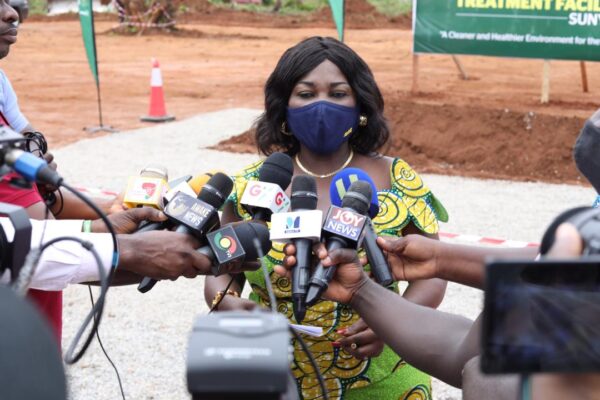The Sanitation and Water Resources (MSWR) Minister, Hon. Cecelia Abena Dapaah has reiterated government’s commitment to support the private sector in creating jobs and developing the country.
Speaking to journalists on Friday September 11, 2020 during the sod cutting ceremony for the construction of a solid waste treatment facility at Nwawasua near Sunyani in the Bono Region by H.E. President Nana Addo Danquah-Akufo Addo, she said the government strongly believes that partnering with the private sector is the way to go in achieving the development needs of the country.
The sod cutting ceremony which forms part of the President’s two-day tour in the Bono Region was done together with the Minister of Sanitation and Water Resources- Cecilia Abena Dapaah, the Bono Regional Minister- Evelyn Kumi-Richardson and the Kontihene of Sunyani Traditional Council- Nana Bofotia Boaponsem II.

The project, which will process solid waste from 12 districts within the region into fertilizer, is expected to be completed within four months, is under a partnership of Zoomlion Ghana Limited (ZGL) and its private sector partners and the Ministry of Sanitation and Water Resources.
This government supports private sector initiatives and we are ready to support any private entity to ensure development,” she stressed.
She added that the government’s approval for Zoomlion and its partners to replicate the project in each region of the country is an evidence to the president’s support to the sector.
She further noted that the waste treatment facilities will greatly help in addressing the sanitation challenges of the country which falls in line with the government’s vision of making the country clean.
She called on every citizen to adhere to good sanitation practices by desisting from littering around and avoid misusing water bodies to safeguard the country’s water sources and the environment as well.

Read also: Establishment of the ministry of sanitation and water resources was in the right direction –Minister
The Kontihene of Sunyani Traditional Council- Nana Bofotia Boaponsem II, on his part urged the government to ensure that the project does not become a white elephant after the sod cutting, but ensure that it is pursued to latter since it will help in addressing the teaming unemployment in the region.
He encouraged other private investors to follow the footsteps of Zoomlion to also invest in the region for maximum returns.
He latter urged his subjects to ensure that they separate their rubbish into organics and all other waste fractions to make the recycling process easier and stress free.
The facility when completed, will have facilities including plastic waste recycling, finished products and spare parts, compost workshop, sorting workshop and an office building. The rest are restaurant, weighing bridge, recycling plant, washing bay, skills training scavengers, clinic and a laboratory.
Waste management is competing with more pressing economic and social issues such as social protection programmes, education and health. The government of Ghana therefore decentralized the waste management system in the country. With this development, local government authorities and private sector actors are now playing key roles in waste management in the country.
Sanitation figures in 2015 showed that rate of waste generation in Ghana was 0.47 kg per person per day, which translates into about 12,710 tons of waste per day. The waste generation rate also varied across geographical locations, the coastal and forest zones generated higher waste than the northern savanna zone.
